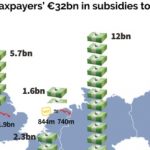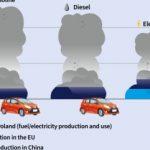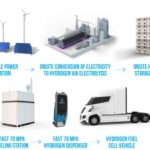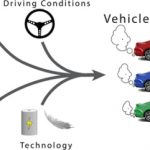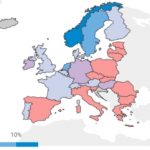It’s very early days but pilot projects for green methanol are underway, explains Gabi Thesing writing for WEF. It’s a low-carbon fuel that can be produced from renewable sources such as biomass or using carbon capture. Compared to traditional fossil fuels it can reduce CO2 emissions by 60-95%, nitrogen oxide by 60-80%, and almost completely eliminate sulphur oxide and particulate matter emissions. Green methanol can be blended with traditional … [Read more...]
Global “explosive” growth means 1 in 3 new cars will be electric by 2030. But SUV emissions could wipe out those gains
More than a third of all new vehicles sold globally in 2030 will be electric, according to the IEA. That’s a doubling of its prediction made only two years ago. Josh Gabbatiss at Carbon Brief summarises the report. The IEA describes the growth as “explosive”: from just 1% of global car sales in 2017, to 14% last year, and now 18% expected by the end of 2023. China has consistently dominated those sales while new policies in the U.S. and EU are … [Read more...]
E-fuels for cars are expensive, and pollute the air as much as petrol
MEPs and governments are currently deciding on an EC proposal for all new cars sold from 2035 to be 100% zero-emissions. Here, T&E present test results that show e-fuels should not be allowed to replace petrol. T&E are concerned that e-fuels are being promoted as a way to prolong the life of ICE vehicles. But their tests show that e-fuels produce just as much NOx, three times more carbon monoxide, and twice as much ammonia. Though e-fuels … [Read more...]
Engineering yeast to create Biofuels from non-food crops (straw, grass, cellulosic waste)
Using ethanol can reduce the global consumption of fossil fuels. But, commercially, ethanol in the U.S. is produced from corn and not enough is grown to make a significant impact on U.S. fuel needs. Anne Trafton at MIT describes research that has engineered yeast to break down straw and woody plant material to create ethanol as efficiently as it’s done from corn. High yields of ethanol were extracted from five different types of cellulosic … [Read more...]
EU’s new 15% emissions cut for EVs looks like 2% thanks to four “allowances”
EU regulations for reducing car emissions have been an important driver for getting European manufacturers to go electric and seek a leading position globally. But new rules will slow that progress, according to Transport & Environment (T&E). What look like rules that require a 15% reduction in CO₂ emissions from new cars from 2025 can mean a drop of as little as 2%, thanks to four “allowances”. Heavier average car weight (and electric … [Read more...]
Only giving tax breaks to zero-emission company cars will accelerate e-mobility
Subsidies and tax breaks for company cars in Europe cost €32bn a year, a hangover from the days when governments were happy to encourage driving. Chris Bowers at T&E reviews a study that explores the issue in a wide range of European nations and reveals that 96% of company cars are petrol and diesel. As an indicator of the scale of emissions, the study says Europe’s 10 largest leasing companies alone – which include BMW’s Alphabet and … [Read more...]
Latest data shows lifetime emissions of EVs lower than petrol, diesel
Critics of the rapid roll out of electric vehicles correctly say that their factory door emissions (i.e. CO2 emitted during manufacture) are higher than those for standard petrol and diesel cars. Then you have to add the emissions of the local grid (how renewable is it?!) that’s charging your EV. But the numbers behind those calculations are always changing. Eoin Bannon at Transport and Environment describes the findings of their new tool that … [Read more...]
Are national fossil fuel car bans compatible with EU laws, intra-trade, movement?
A growing number of EU nations are announcing laws to phase out the sale of new fossil fuel cars within the next 20 years. But are the proposed bans compatible with EU laws, or even workable given cross border trade and movement rights? If you are Dutch, why not buy your new petrol car in Belgium, then drive it back to the Netherlands? How do you enforce CO2 targets with foreign haulage fleets transiting through your nation? Eoin Bannon at … [Read more...]
Hydrogen Fuel Cell trucks can decarbonise heavy transport
Patrick Molloy at Rocky Mountain Institute runs through the pros and cons of hydrogen fuel cell vehicles (FCEVs). The big pluses are that hydrogen has an energy density of around 120 MJ/kg, almost three times more than diesel or gasoline. Half the energy generated by an internal combustion engine is wasted as heat, whereas electric drivetrains used by FCEVs only lose 10%. Nikola Motors, a U.S. maker of hydrogen trucks, claims its vehicles can get … [Read more...]
Lightweight Gasoline Cars: a necessary 30-year stop gap?
We should all be driving electric vehicles. But we have to wait for renewable electric grid capacity to support them all, charging points everywhere, and enough new batteries to be manufactured and put in all the new, affordable BEVs. And we’re running out of time. An interim solution has come from a study by MIT and Ford. David Chandler, writing for MIT, explains the study, which says that an interim solution – for certain regions - is … [Read more...]
U.S. Military’s mobile mini-nuclear: fewer fuel supply convoys mean fewer casualties
U.S. Military figures show the resupply of liquid fuel and drinking water for troops in-theatre costs about 4 lives for every 100 convoys. It makes an army more vulnerable and limits movement. That’s why the U.S. Department of Defense is looking at very small modular nuclear reactors (vSMRs): sub-10MW nuclear units. They are already being designed, built and tested. If successful, no refuelling is required for years and the units can be … [Read more...]
New Car sales data shows EVs still a luxury as Petrols keep rising
It’s hard to argue that the EV revolution is around the corner when petrol car sales keep rising. Yes, diesel sales are falling, but more people are switching to petrol than EVs. This month, two data releases from the European Automobile Manufacturers' Association (ACEA) show that EV’s big gains are only happening in the high income countries. Even wealthy Norway’s 49.1% EV market share is an exception. The nations that come second and third are … [Read more...]







